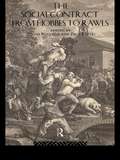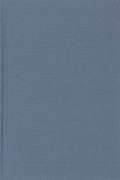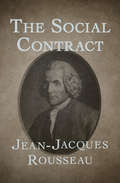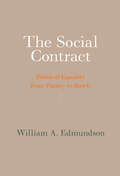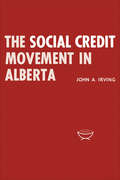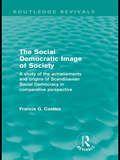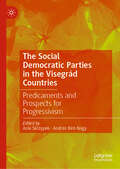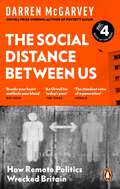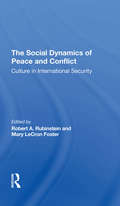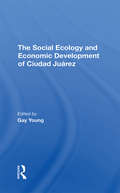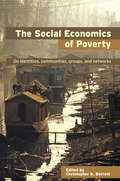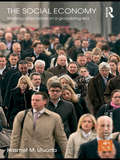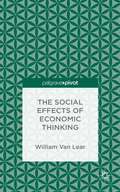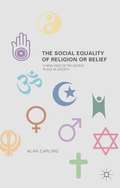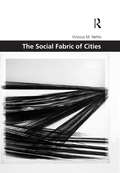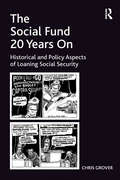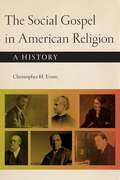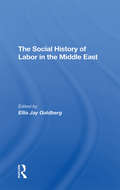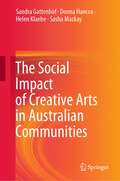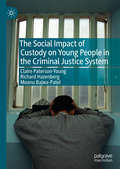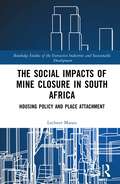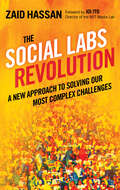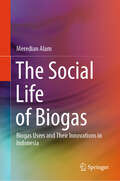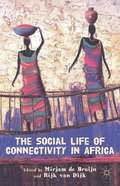- Table View
- List View
The Social Contract from Hobbes to Rawls
by Paul Kelly David BoucherFirst published in 2004. Routledge is an imprint of Taylor & Francis, an informa company.
The Social Contract, Discourse On The Virtue Most Necessary For A Hero, Political Fragments And Geneva Manuscript
by Jean-Jacques Rousseau Christopher Kelly Judith R. Bush Roger D. MastersContains the Social Contract, as well as the first English translation of Rousseau's early Discourse on the Virtue Most Necessary for a Hero, numerous previously untranslated political fragments, and the first draft of the Social Contract (the so-called Geneva Manuscript). By placing Rousseau's famous exposition of "political right" and the "general will" in the context of his preparatory drafts, the editors provide significant insight into the formation of one of the most important and influential works in Western political thought.
The Social Contract: Or, The Principles Of Political Rights (World Classics Ser.)
by Jean-Jacques RousseauThe eighteenth-century philosopher&’s landmark treatise against monarchy that inspired the French and American Revolutions. &“Man is born free, and everywhere he is in chains.&” With these stirring words, Jean-Jacques Rousseau begins The Social Contract—the first shot in a battle of ideas that would set the stage for the American War of Independence and the French Revolution. In the feverish days of the Enlightenment, Rousseau took aim squarely at the all-powerful French monarchy, proclaiming that no despot, no matter how powerful, had the right to terrorize his people. He laid out a plan for a new kind of government—an idea that was radical then, and remains so now. The Social Contract is a landmark document from a fascinating period in world history and an invaluable guide to the foundations of modern democracy. This ebook has been professionally proofread to ensure accuracy and readability on all devices.
The Social Contract: Political Equality from Putney to Rawls
by William A. EdmundsonWe are all parties to a social contract and obligated under it. Or is this mere fiction? How is such an agreement possible in a society riven by deep moral disagreement? William Edmundson explains the social-contract tradition from its beginnings in the English Revolution, through Hobbes, Locke, and Rousseau to its culmination in the work of John Rawls. The idea that legitimate government rests on the consent of free equals took shape in the seventeenth century and was developed in the eighteenth but fell into disuse in the nineteenth century even as democracy, toleration, and limited government gained ground. Edmundson shows how Rawls revived the idea of a social contract in the mid-twentieth century to secure these gains, as the then-dominant moral theories, such as utilitarianism, could not. The book also defends Rawls's conviction that political equality is integral to the idea of reciprocity at the heart of the tradition.
The Social Credit Movement in Alberta
by John Irving"On the night of August 22, 1935, as Canadians listened to their radios, they heard, with amazement and incredulity, that the first Social Credit government in the world had been elected that day in the province of Alberta. . . . Before the tabulation of votes was completed, telephone calls from New York and London, headlines in newspapers, spot news in broadcasts, had confirmed the slogan of Social Crediters, 'The Eyes of the World are on Alberta.' The morning after the election a number of people lined up at the city hall in Calgary to collect the first installment of the Social Credit dividend of $25 monthly, which, they confidently believed, would be immediately forthcoming from their new government." This quotation from Professor Irving's book indicates how the apparent suddenness of the Social Credit rise to power and the magnitude of the victory aroused world-wide comment. Why had the doctrines of Social Credit, promoted unsuccessfully in the British Commonwealth and the United States for nearly twenty years, achieved political acceptance in Alberta? Why had the people of Alberta elected to public office persons so little experienced in the economic and political world as William Aberhart and his Social Credit colleagues? Professor Iving answers these questions and analyses systematically and comprehensively the rise of the movement as a phenomenon of mass psychology. His study, based mainly on interviews, supplemented with references to private papers, newspapers, and government sources provides a truly fascinating record.
The Social Democratic Image of Society: A Study of the Achievements and Origins of Scandinavian Social Democracy in Comparative Perspective (Routledge Revivals)
by Francis CastlesThis book, originally published in 1978, constitutes a genuinely comparative study of the world's only truly succesful democratic socialist parties: the Social Democraic Parties of Denmark, Norway and Sweden. The measure of achievement is not merely political success, the fact that in Scandinavia the Social Democrats have become 'natural parties of goverment', for just as importantly, the author shows that a political success grounded on the symbiotic relationship between party and trade union movement has been the foundation for a higher level of welfare state provision and egalitarian striving than in virtually any other advanced Western nations. It is a book for friends and foes of democratic socialism alike; for the former to provide an understanding of the tasks ahead and for the latter to know the enemy better.
The Social Democratic Parties in the Visegrád Countries: Predicaments and Prospects for Progressivism
by Ania Skrzypek András Bíró-NagyThis book provides an in-depth analysis of the social democratic parties in the four member states of the so-called “Visegrád Group”- Czech Republic, Hungary, Poland and Slovakia. The timeline spans the last two decades, which saw the parties in question come to power, govern and collapse. The case studies of all four countries are structured in the same way, offering: explanation of the historical background (including electoral results), analyses of the context, structures, membership and voters; evaluation of the programmes and hypotheses for potential future trajectories. Given the European relevance of the topic, the fifth chapter provides a comparative analysis, with a handful of explanations as to why Visegrád Group countries have proved to be tough partners in European integration processes.
The Social Distance Between Us: How Remote Politics Wrecked Britain
by Darren McGarvey*A RADIO 4 BOOK OF THE WEEK**SHORTLISTED FOR THE RATHBONES FOLIO PRIZE FOR NON-FICTION**LONGLISTED FOR THE RSL ONDAATJE PRIZE*'An Orwell for today's poor' - The Times'The standout, authentic voice of a generation' Herald'McGarvey is a rarity: a working-class writer who has fought to make the middle-class world hear what he has to say' Nick Cohen, GuardianWhy are the rich getting richer while the poor only get poorer? How is it possible that in a wealthy, civilised democracy cruelty and inequality are perpetuated by our own public services? And how come, if all the best people are in all the top jobs, Britain is such an unmitigated bin fire?Join Darren McGarvey on a journey through a divided Britain in search of answers. Here, our latter-day Orwell exposes the true scale of Britain's social ills and reveals why our current political class, those tasked with bringing solutions, are so distanced from our lived experience that they are the last people you'd want fighting your corner.Praise for Darren McGarvey:'Utterly compelling' Ian Rankin, New Statesman'Brilliant' Russell Brand'An absolutely fascinating individual' Owen Jones'Offer[s] an antidote to populist anger that transcends left and right... articulate and emotional' Financial Times
The Social Dynamics Of Peace And Conflict: Culture In International Security
by Mary Lecron Foster Robert A RubinsteinThis volume shows the importance for international security studies for better understanding the social dynamics of peace and conflict. It illustrates the crucial role that culture and symbols play in facilitating peace or fostering conflict and intended for anthropologists widely.
The Social Ecology And Economic Development Of Ciudad Juarez
by Gay Young Robert H Schmidt Oscar J Martinez Kathleen A StaudtAs the issue of immigration between Mexico and the United States becomes more critical, it is increasingly important that we understand the process of development in Mexico's northern border region. This collection of essays offers an empirical analysis of development in Ciudad Juárez, with an emphasis on the social and spatial contexts in which economic relations occur. The analyses are framed by a general discussion of urbanization, migration, and industrialization, considered in light of the history of Mexico's northern frontier. Contributors recount the city's pattern of urban growth in response to the natural environment and the changing national culture and examine current patterns of land use, especially as compared to similar development in other Latin American cities. Other issues considered are the impact on household activities of the structure of women's participation in the maquiladora work force; the city's use of its human resources, especially in off-shore assembly activities; and the foreign orientation of the Juárez economy.
The Social Economics of Poverty: On Identities, Communities, Groups And Networks (Priorities for Development Economics)
by Christopher B. BarrettA unique analysis of the moral and social dimensions of microeconomic behaviour in developing countries, this book calls into question standard notions of rationality and many of the assumptions of neo-classical economics, and shows how these are inappropriate in communities with widespread disparity in incomes. This book will prove to be essential for students studying development economics.
The Social Economy: Working Alternatives in a Globalizing Era (Rethinking Globalizations #Vol. 17)
by Hasmet M. UluortaCritically examining economic developments within the last sixty years, this book argues that a crisis in global social reproduction is altering existing understandings of work, labour and the economy. The author of this original volume, Hasmet M. Uluorta, contends that the crisis in the global economy is triggering a potential paradigm shift from one defined under the rubric of Employment to an alternative theorized as Work. Discussing the Employment paradigm that formed the dominant mode of development after the Second World War through to the 1970s, the author considers the economic and political forces that resulted in its eventual decline. Focusing on already existing practices of organizations and workers in Toronto, Canada, the book goes on to consider the shift to Work and the consequent rise in the social economy which has broken down conventional categories of work and leisure. The author concludes that the social economy presents fundamental challenges to understandings that underpinned the previous economic order. Building on insights from a range of disciplines, The Social Economy will be of interest to students and scholars of international political economy, international relations, labour studies, sociology, and globalization studies.
The Social Effects of Economic Thinking
by William Van LearThe book explains how social outcomes result from the influence of economic ideas which are themselves strongly impacted by the distribution of power in society. The book examines policies and programs of contending interests, emphasizing the importance of socio-economic issues stemming from quasi-economic stagnation.
The Social Equality of Religion or Belief: A New View of Religion's Place in Society
by Alan CarlingThe Social Equality of Religion or Belief.
The Social Fabric of Cities (Design and the Built Environment)
by Vinicius M NettoBringing together ideas from the fields of sociology, economics, human geography, ethics, political and communications theory, this book deals with some key subjects in urban design: the multidimensional effects of the spatial form of cities, ways of appropriating urban space, and the different material factors involved in the emergence of social life. It puts forward an innovative conceptual framework to reconsider some fundamental features of city-making as a social process: the place of cities in encounters and communications, in the randomness of events and in the repetition of activities that characterise societies. In doing so, it provides fresh analytical tools and theoretical insights to help advance our understanding of the networks of causalities, contingencies and contexts involved in practices of city-making. In a systematic attempt to bring urban analysis and research from the social sciences together, the book is organised around three vital yet relatively neglected dimensions in the social and material shaping of cities: (i) Cities as systems of encounter: an approach to urban segregation as segregated networks; (ii) Cities as systems of communication: a view of shared spaces as a means to association and social experience; (iii) Cities as systems of material interaction: explorations on urban form as an effect of interactivity, and interactivity as an effect of form. Visit the author’s website at: http://socialfabric.city/
The Social Foundations of World Trade
by Sungjoon ChoAs highlighted by Pascal Lamy, the former head of the WTO, world trade traditionally involves state-to-state contracts and is based on an anachronistic 'monolocation' production/trade model. It therefore struggles to handle new patterns of trade such as global value chains, which are based on a 'multilocation' model. Although it continues to provide world trade on a general level with a powerful heuristic, the traditional 'rationalist' approach inevitably leaves certain descriptive and normative blind spots. Descriptively, it fails to explain important ideational factors, such as culture and norms, which can effectively guide the behaviour of trading nations with or without material factors such as interests and utilities. Normatively, the innate positivism of the traditional model makes it oblivious to the moral imperatives of the current world trading system, such as development. This book emphatically redresses these blind spots by reconstructing the WTO as a world trade community from a social perspective.
The Social Fund 20 Years On: Historical and Policy Aspects of Loaning Social Security
by Chris GroverIn 2008 the Social Fund had been in operation for 20 years. This has provided a timely opportunity to not only critically reflect upon its introduction in 1988 and its operation in the past two decades, but also to place it within its historical context. There is a particular need to engage with the argument that was made in the 1980s that relieving need by way of loan was new in social security policy. In this groundbreaking study, Chris Grover provides the reader with evidence that this is not the case by locating Social Fund loans in a lengthy history of debate about, and practice in, loaning poor relief and social security. Using primary data hitherto unused in social policy research, Grover shows that there is a long history embedded in British systems of poor relief of authorities having the power to loan applicants either cash that had to be repaid or providing food and items, the value of which then had to be repaid. Understanding this history will give a greater depth to our understanding of the state's purposes in relieving the financial needs of the poorest people as well as to our knowledge of contemporary social security policy.
The Social Gospel in American Religion: A History
by Christopher H EvansA new and much-needed history of one of America&’s most important religious movements . . . from before the Civil War to after Civil Rights to Barack Obama.&” —Barry Hankins, Professor of History, Baylor University The global crises of child labor, alcoholism and poverty were all brought to our attention through the social gospel movement. Its impact on American society makes it one of the most influential developments in American religious history. Christopher H. Evans traces the development of the social gospel in American Protestantism, and illustrates how the religious idealism of the movement also rose up within Judaism and Catholicism. Contrary to the works of previous historians, Evans demonstrates how the presence of the social gospel continued in American culture long after its alleged demise following World War I. Evans reveals the many aspects of the social gospel and their influence on a range of social movements during the twentieth century, culminating with the civil rights movement in the 1950s and 1960s. It also explores the relationship between the liberal social gospel of the early twentieth century and later iterations of social reform in late twentieth century evangelicalism.The Social Gospel in American Religion considers an impressive array of historical figures including Washington Gladden, Emil Hirsch, Frances Willard, Reverdy Ransom, Walter Rauschenbusch, Stephen Wise, John Ryan, Harry Emerson Fosdick, A. J. Muste, Georgia Harkness, and Benjamin Mays. It demonstrates how these figures contributed to the shape of the social gospel in America, while arguing that the movement&’s legacy lies in its profound influence on broader traditions of liberal-progressive political reform in American history.
The Social History Of Labor In The Middle East
by Ellis GoldbergOnce considered of little import, the social history of labor in the Middle East emerged in the 1980s as a major area of research, as historians sought to uncover the roots of working-class organizing. This volume, the first in an important new series, presents a broad overview of recent literature on the history of workers in the Middle East since 1800 in a bold effort to bring together new directions in research and to reexamine the relevance of established ones. Contributors explore the history of labor by situating state-led industrialization within the context of older artisanal social communities. They examine how industrialization enhanced government control over the economy as a whole and analyze the public's reaction to centralized economic authority. They also explain the longevity of social coalitions supporting state industrial monopolies and examine their breakdown, along with the emergence of Islamist and other oppositional movements. Taken together the essays provide a historically grounded context for viewing the shifting relationship between states and the world economy as well as between particular states and classes and form a rich synthesis of current interdisciplinary literature on work and workers in the region.
The Social Impact of Creative Arts in Australian Communities
by Sandra Gattenhof Donna Hancox Helen Klaebe Sasha MackayThis book brings together discussions about Australian arts policy and funding, outcomes of arts engagement in terms of social inclusion, well-being and education. It presents exemplars of creative programs or case studies that build capacity and lasting impact for communities in urban and regional Australia. This book describes the impact of the arts using narrative case studies. Through this, it develops conceptual understanding and frameworks that can be used to dynamically assess the value and impact of arts engagement across the three types of cultural value: intrinsic value, instrumental value and institutional value. It focuses on how arts engagement creates, supports and extends factors such as well-being, social inclusion and educational achievement. This book provides an innovative examination of the evidence from Australian projects depicting the impact of the arts on a range of indicators and sectors.
The Social Impact of Custody on Young People in the Criminal Justice System
by Claire Paterson-Young Richard Hazenberg Meanu Bajwa-PatelThis book explores the journey of young people through a Secure Training Centre and, more generally, the criminal justice system in the UK. It examines the extent to which young people have been failed by the system at every stage of their lives, with incarceration used as a means of removing ‘the problem’ from society. To explore this process, the authors utilise an integrated theoretical framework to develop a new rehabilitative approach focused on developing positive outcomes for young people. The book deploys a social impact measurement methodology to evaluate the experience and outcomes of youth justice interventions at a Secure Training Centre. Such an approach provides a fresh perspective on the youth justice debate which has traditionally utilised outcome data to measure immediate impact relating to recidivism and is therefore not focused on the young person holistically. Using a social impact framework to evaluate youth justice, underpinned by an integrated theoretical framework, allows for assessment to be made which place the young person at the centre of evaluation.
The Social Impacts of Mine Closure in South Africa: Housing Policy and Place Attachment (Routledge Studies of the Extractive Industries and Sustainable Development)
by Lochner MaraisThis book investigates the relationship between mining, mine closure and housing policy in post-apartheid South Africa, using concepts from new institutional economics and evolutionary governance theory. Mine closures present a major challenge to the mining industry and governments, with this being particularly noticeable in the Global South. This book argues that the dependencies created by the mining industry and mine housing policies while a mine is operational cause serious societal problems when it closes. To demonstrate this, the book applies the concepts of place attachment, asset-based development and social disruption. Conceptually, the book challenges the view that place attachment and asset-based development are the most appropriate and often the only policy responses in mining areas. In South Africa, the mining industry and the government have created comprehensive housing programmes linked to homeownership to promote place attachment, stability and wealth among mine workers. These programmes do not consider the disruption that mine closure might bring. The book challenges the blind application, during boom periods, of policies which create long-term dependencies that are difficult to manage when a mine closes. This book will be of interest to students and scholars researching the social impacts of mining and the extractive industries, social geography and sustainable development, as well as policymakers and practitioners working with mine closure or social impact assessments.
The Social Labs Revolution: A New Approach to Solving our Most Complex Challenges
by Zaid HassanCurrent responses to our most pressing societal challenges—from poverty to ethnic conflict to climate change—are not working. These problems are incredibly dynamic and complex, involving an ever-shifting array of factors, actors, and circumstances. They demand a highly fluid and adaptive approach, yet we address them by devising fixed, long-term plans. Social labs, says Zaid Hassan, are a dramatically more effective response. Social labs bring together a diverse a group of stakeholders—not to create yet another five-year plan but to develop a portfolio of prototype solutions, test those solutions in the real world, use the data to further refine them, and test them again. Hassan builds on a decade of experience—as well as drawing from cutting-edge research in complexity science, networking theory, and sociology—to explain the core principles and daily functioning of social labs, using examples of pioneering labs from around the world. He offers a new generation of problem solvers an effective, practical, and exciting new vision and guide.
The Social Life of Biogas: Biogas Users and Their Innovations in Indonesia
by Meredian AlamThis is the most comprehensive book discussing the impact of renewable energy transition by engaging local narratives, and combining this with the domestication of technology theory. Addressing a specific concern, the discussion considers the development of household biogas from an interdisciplinary sociological perspective and addresses the success factors for the implementation of biogas policy on the household level in Indonesia. Drawing upon extensive ethnographic fieldwork in a rural Indonesia, this book explores the interactive process of social and technological innovation from a user perspective. Their social interactions with wider stakeholders such as biogas technology trainers, laborers, construction partner organizations, and fellow users are examined. The author sheds light on emerging evidence around biogas sustainability by engaging a unique interdisciplinary framework that combines aspects of both sociology and engineering. Offering a unique insight, this book is relevant for social scientists, postgraduate students, social workers, environmental activists, communication experts, and engineers working across aspects of renewable energy development. They will gain new interdisciplinary insights and applicable approaches to building household biogas by actively engaging the users.
The Social Life of Connectivity in Africa
by Mirjam De Bruijn Rijk Van DijkThe rapid increase in adoption of modern 'connective' technologies like the mobile phone has reshaped the social landscape of Africa. This book examines the myriad possibilities that the post-global moment offers African societies to develop and to relate, offering profound new insights into the processes of globalization.
